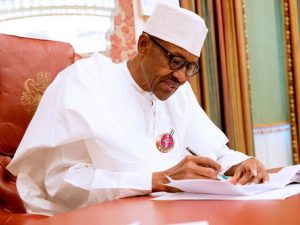
April 20, 2018//-Nigerians have praised the Buhari-led government and military efforts to fight violent extremism in the Africa’s most populous country high.
However in the latest Afrobarometer survey they expressed high levels of fear and personal experience of such violence in the country.
They see extremist groups as receiving support from a wide variety of sources in the government, military, and extremist organizations abroad, and they believe that the most effective steps the government can take to fight their activities are to strengthen the economy as well as the military response, the Afrobarometer survey said.
Most Nigerians in the Africa’s largest economy are also concerned about the herder-farmer conflicts, and only about half think the government has been effective in preventing or resolving them.
In recent years, bombings, kidnappings, and intimidation by Boko Haram have killed more than 20,000 people and led to the displacement of about 2.6 million others.
Violent conflicts between nomadic herders and farmers over the use of land and water, destruction of farms, and theft of livestock have also increased, killing an estimated 2,000-3,000 people since 2016 and costing the country at least $14 billion in potential revenues annually due to the loss of crops and livestock in Nigeria’s rich agricultural zone.
|
Key findings Worried about violence o One in 10 Nigerians (11%) say they have personally experienced extremist violence during the past two years, in addition to 25% who say they have feared such violence . Both fear and experience of extremist violence are most common in the North East and North Central zones. o Even larger proportions say they have experienced or feared violence by people in the neighbourhood/village or at political events. o Seven in 10 Nigerians say they are “very concerned” (48%) or “somewhat concerned” (23%) about the violent conflicts between farmers and herders (Figure 2). Extremist violence § o International extremist groups are most widely blamed for supporting violent extremist groups in the country (Figure 3). But most Nigerians believe that domestic terror groups are receiving support from a wide range of influential sources, including at least “some” senior government leaders, members of the National Assembly, members of the military, local government officials, and traditional leaders. o Citizens believe the main reasons why people join extremist groups are unemployment (cited by 31% of respondents) and poverty (27%). |
Three-fourths of Nigerians say the government has been “somewhat effective” (39%) or “very effective” (35%) in addressing the problem of armed extremists in the country.
o Large majorities “agree” or “strongly agree” that the army keeps the country safe from insurgents (83%), gets necessary training to defend and protect the country (82%), and operates in a professional manner (77%).
o Nigerians say the best ways for the government to effectively address the problem of armed extremists are to improve the economy/create jobs and to strengthen the military response.
Herder-farmer violence
- o About half (53%) of Nigerians say the government is performing “fairly well” or “very well” in preventing or resolving violent community conflict, while almost as many (46%) rate the government’s efforts as “fairly bad” or “very bad” .
Instructively, Afrobarometer is a pan-African, non-partisan research network that conducts public attitude surveys on democracy, governance, and related issues across more than 30 countries in Africa. The Afrobarometer national partners in Nigeria, CLEEN Foundation and Practical Sampling International, interviewed a nationally representative, random, stratified probability sample of 1,600 adult Nigerians between 26 April and 10 May 2017.
A sample of this size yields country-level results with a margin of error of +/-2% at a 95% confidence level. Previous surveys have been conducted in Nigeria in 1999, 2002, 2005, 2007, 2008, 2012, and 2014.
African Eye Report


